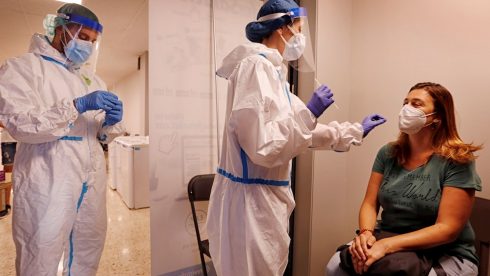WITH the flu season looming and COVID-19 still spreading, Spanish experts have highlighted the main differences between both viruses.
With influenza, COVID-19, and the usual cold-weather respiratory infections in circulation, Spanish experts say it’s bound to be a confusing season for people and health professionals to sort out what to do when patients fall ill.
“This year, the advance of the flu vaccination campaign and PCR tests are the only way to take the pressure off hospitals and health centres,” said Jose Ignacio Peis, of the Spanish Society of Primary Care Physicians (SEMERGEN).
Symptoms of the common cold and influenza can be confused with those of COVID-19, so in a health system that is struggling due to the pandemic, diagnosis is crucial.
The typical symptoms of flu are relatively consistent – fever, cough and muscle aches.
These are also common in COVID-19, but as the pandemic has progressed, it has become clear that COVID-19 symptoms vary more wildly, from asymptomatic patients to those who develop deadly pneumonia.
What are the overlapping symptoms?
As highlighted by Peis, influenza and COVID-19 cause respiratory illnesses and some of their most characteristic symptoms are similar: fever, cough, fatigue, difficulty in breathing, sore throat, nasal mucus, muscle pain and headache.
ADDITIONAL SYMPTOMS OF COVID-19
There are other signs of COVID-19 that flu sufferers do not have, such as loss of taste or smell, skin rashes, or colour changes on the fingers or toes.
These are mild symptoms that begin gradually, while usually a fever and cough are the first thing a person infected with the new coronavirus experiences.
People with COVID-19 may also have diarrhoea, something that children who get the flu can also get.
Infection caused by coronavirus can quickly evolve ‘into serious respiratory problems’ warns Peis, who coordinates the SEMERGEN Preventive Activities and Public Health working group, meaning that patients have to be evaluated regularly.
In fact, people who have a fever or cough and also have difficulty breathing, feel pain or tightness in the chest or have difficulty speaking or moving should ‘call a doctor immediately,’ he said.

According to Peis, the symptoms of the common cold, usually caused by rhinoviruses, are easily distinguished because they are much milder than those of influenza and COVID-19 and begin more gradually.
Influenza and COVID-19 are transmitted in the same way: through droplets and small particles expelled with coughing or sneezing, as well as by direct contact and with surfaces.
However, coronavirus is more contagious among certain populations and age groups than the influenza virus and generates many more cases of ‘super-spreaders’ (people who infect a large number of people).
After infection, signs of the disease show up earlier in an influenza patient (1-4 days after infection) than in a COVID-19 patient.
In the latter case, the illness is revealed around the fifth day after contact with an infected person, but can vary from two to 14 days after infection.
RECOVERY AND COMPLICATIONS
Both influenza and coronavirus can cause serious complications, especially in older people, those with previous pathologies and pregnant people.
In children, however, influenza can cause more serious conditions than COVID-19.
But COVID-19 is a disease that attacks not only the respiratory system, but also the immune and cardiovascular systems, Peis says.
In fact, according to the health expert, some of these patients develop blood clots in their lungs, heart, legs or brain; and, in the case of children, there have been cases of multi-systemic inflammatory syndrome.

Flu patients generally recover within one to two weeks without the need for medical treatment. In the case of COVID-19, one in five people end up with a serious condition and experience breathing difficulties.
Other Spanish experts echo Peis’ diagnosis and advice and highlight the importance of the flu vaccine in a year marked by the COVID-19 pandemic.
“In the coming months COVID-19 and the flu will coexist and this could put particular strain on our health system,” said the Secretary of State for Health, Silvia Calzon.
Similarly, the Spanish Society of Out-of-Hospital Paediatrics and Primary Care (SEPEAP) recommends universal influenza vaccination from the age of six months to refine the diagnosis of COVID-19.











